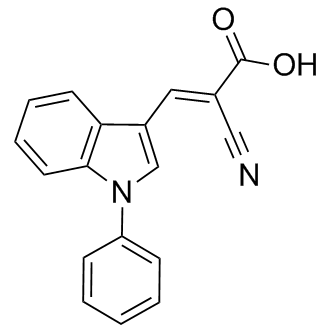| Cas No.: | 56396-35-1 |
| Chemical Name: | PF-1005023; UK5099; UK 5099; PF1005023; PF 1005023 |
| Synonyms: | PF-1005023; UK5099; UK 5099; PF1005023; PF 1005023 |
| SMILES: | C([O-])(=O)/C(/C#N)=C/C1C2=C(N(C3=CC=CC=C3)C=1)C=CC=C2 |
| Formula: | C18H12N2O2 |
| M.Wt: | 288.31 |
| Sotrage: | 2 years -20°C Powder, 2 weeks 4°C in DMSO, 6 months -80°C in DMSO |
| Description: | UK-5099 is a potent inhibitor of the mitochondrial pyruvate carrier (MPC). UK-5099 ihibits pyruvate-dependent O2 consumption with an IC50 of 50 nM. |
| In Vivo: | The MPC inhibitor UK5099 increases the glucose excursion seen during an intraperitoneal glucose tolerance test in C57BLK mice[4]. |
| In Vitro: | The trypanosomal pyruvate carrier is found to be rather insensitive to inhibition by alpha-cyano-4-hydroxycinnamate (Ki=17 mM) but can be completely blocked by UK-5099 (Ki=49 microM)[2]. UK-5099 also inhibits the monocarboxylate transporter (MCT) [3]. UK5099 significantly inhibits the glucose-stimulated rise in oxygen consumption in a dose-dependent manner and at 150 μM reduced oxygen consumption below basal levels. UK5099 reduces ATP levels and increases ADP and AMP levels in 832/13 cells[4]. The UK5099 treated cells show significantly higher proportion of side population fraction and express higher levels of stemness markers Oct3/4 and Nanog. UK5099 application may be an ideal model for Warburg effect studies[5]. |

 To enhance service speed and avoid tariff delays, we've opened a US warehouse. All US orders ship directly from our US facility.
To enhance service speed and avoid tariff delays, we've opened a US warehouse. All US orders ship directly from our US facility.




















